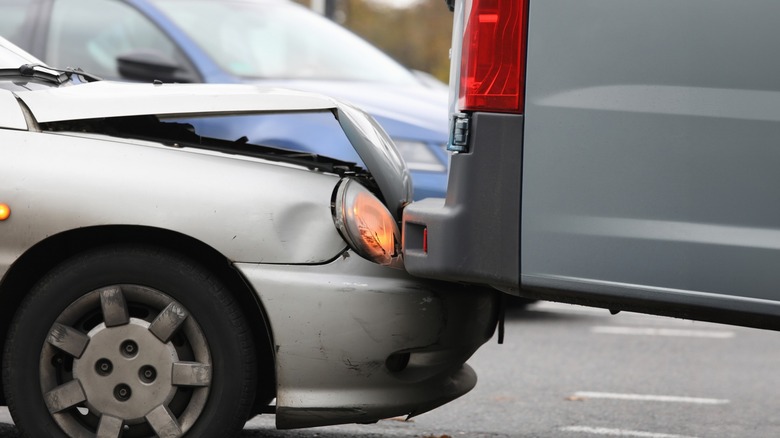What's A Rebuilt Title, And Should You Buy A Car With One?
When you're in the market for a used car, you might discover listings for vehicles with a rebuilt title. At first glance, these cars can seem suspiciously cheap. You'll be getting a car with modern features and relatively low mileage for a fraction of the cost. However, the rebuilt title carries some stigma, and for good reason.
In essence, a rebuilt title indicates that an insurance company had once certified the vehicle as a total loss. Since that happened, the car has since been repaired, re-inspected, and allowed back on the road. Naturally, with such a title, you become curious about the car's history and how safe and reliable it is in the long term.
As a potential buyer, you should pay attention to every detail, including understanding what a rebuilt title fully entails. A rebuilt title car is undeniably attractive when you think about the cost savings. However, you still need to consider the unique set of risks that come with it, like safety concerns and potential challenges you might face when trying to insure the vehicle or when you eventually decide to resell.
What's a rebuilt title?
In the event of a severe accident, a terrible flood, or even a fire that wrecks a car, an insurance company will typically come in to inspect the car and assess just how bad the damage is. If it's really bad, the company could write it off as a total loss because the cost of fixing it is nearly as much as the cost of buying a new one and just not worth it. So, the car typically acquires a salvage title, indicating that the car is not roadworthy in its current state.
But that's not the end of the road for cars like this. At auctions, rebuilders, salvage yards, or individuals buy these cars and try to repair them. These repairs can be straightforward but, they are often more complex and involve replacing major components like the transmission or even fitting a new engine.
After completing the repairs, the car has to go through a rigorous inspection process. Depending on the local regulations, a state-approved inspector or certified repair facility will conduct this inspection. Their duty here is simple but serious— verify that the car is safe to drive and that all repairs were done properly. If the car passes the inspection, the state issues a rebuilt title. While the car may now be roadworthy, the fact that it had been wrecked and then repaired remains a permanent part of its record.
What are the pros of buying a car with a rebuilt title?
A car with a rebuilt title sells for much cheaper than similar cars with a clean title. You could get discounts as low as 50 percent off the market value. For anyone on a budget, this is an attractive offer that's hard to resist. For some, it means they can afford a higher-end model or a relatively new car that would otherwise be out of reach at full price.
Whether it's a wise investment depends on the level of damage and the quality of repair work. The damage might not be as severe as you imagine. Plus, in some cases, the mechanics or professional rebuilders take their time to repair the car with high-quality parts and meticulous workmanship. They ensure that the car meets and even exceeds safety standards. So, if you're lucky, you might end up with a car in excellent condition despite its history.
Another angle is this: some cars with rebuilt titles are rare or discontinued models that are hard to find in the regular market. Your best chance of owning that specific make or model could be by buying a car with a rebuilt title. This is also a sustainable decision — by buying a vehicle that has been restored rather than scrapped, you are reducing waste and making an eco-friendly choice.
What are the cons of buying a car with a rebuilt title?
Buying a car with a rebuilt title is undeniably attractive when you consider how much you'll be saving, but because of the car's history, many insurance companies will be reluctant to provide comprehensive coverage. So, it'll be difficult to insure this car.
Additionally, cars with rebuilt titles don't come with a manufacturer warranty, and finding an extended warranty can be equally difficult and expensive. Without a warranty, you'll have to pay out of pocket for most repairs. Even if the car appears to be in good condition, there might still be some issues that aren't immediately obvious.
Although it must pass inspections to be declared roadworthy, there's always a chance that the rebuilders cut corners to save costs. It becomes a double whammy — there's the stress of constantly wondering if the car has hidden problems or if it's truly safe for you. Plus, when these hidden issues start to crop up, repairing them can be expensive.
It's a good idea to take a mechanic you trust with you to inspect the car thoroughly before you make a final decision. While they might catch some problems, it's not always possible to identify every potential issue. If you decide to buy this car, you should know that reselling the car won't be a quick fix. Most people are wary of buying a car with a rebuilt title, and that means you may have to wait a long time to sell and could end up selling at a really low price.
Here's what you should do if you decide to buy one
Before making any payments, have the car thoroughly inspected by a reliable mechanic. This is not a basic check. The goal is to identify any underlying issues or subpar repairs. The mechanic should examine the car's frame, engine, transmission, and electrical components, among other things. If you can, find a mechanic who specializes in salvaged and rebuilt vehicles because they are more likely to catch potential problems that others might miss.
You should also ask for documentation of these repairs. Try to find out the extent of the damage. Look for receipts that give you some insight into what kind of parts the rebuilders purchased and who carried out the repairs. Also, get a detailed vehicle history report from the National Motor Vehicle Title Information System (NMVTIS). While people usually use third-party services like Carfax for a fee, remember that there's no guarantee their reports are 100 percent accurate.
One challenge in getting an accurate, comprehensive report is the incidence of title washing. Because there is no federal law regulating salvage and rebuilt titles in the United States, the regulations vary by state. Title washing occurs when a dealer transfers a vehicle to a different state that does not carry forward the title brands from other states in a sneaky attempt to hide the car's history. So, it's quite possible to buy a car with a rebuilt title and not even be aware of its true history.




